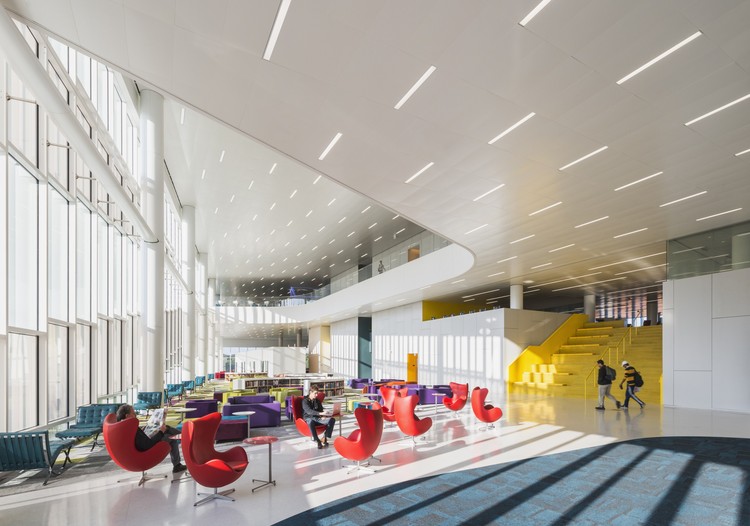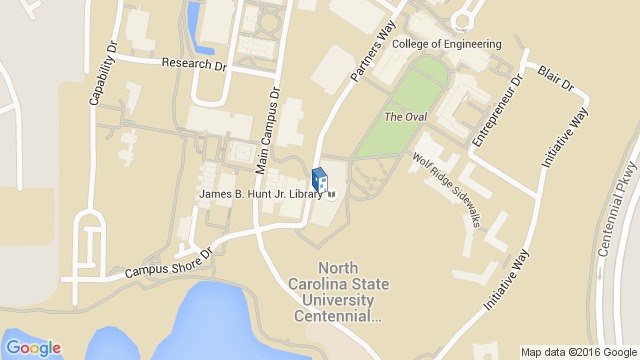
-
Architects: Snøhetta
- Area: 221122 ft²
- Year: 2013
-
Photographs:Mark Herboth, Wiss, Janney, Elstner Associates, Inc, Jose Parla
-
Manufacturers: Rieder Group, Sika, Thos. Moser, Barcol-Air USA, Covering Chile, David Allen, Dematic, Knoll International, Milliken, Selux, Sound Seal, Steel Ceilings

Text description provided by the architects. Snøhetta’s Hunt Library design balances the understood pre-existing needs with the University’s emerging needs to create a forward-thinking learning environment. While clearly a contemporary structure within a traditional context of the NCSU campus, the Hunt Library provides a positive platform for influencing its surroundings. Both technical and programmatic innovations are celebrated as part of the learning experience and provide a versatile and stimulating environment for students.

Generous open spaces connect all floors of the library and open stairs emphasize an interactive and social environment alongside more focused study areas. A wide variety of study and learning environments, and technology-focused experimental labs break the now ubiquitous model of the learning commons. “Disruptive” learning spaces with colorful, dynamic furnishings exist beside more traditional study rooms. The design recognizes the power of chance encounters and celebrates the role of physical space in the intellectual stimulation of its users.

The new LEED Silver (pending) project provides spaces awash with natural light, expansive views of the nearby lake and outdoor break and seating areas. The building’s façade of fritted glass and a fixed external aluminum shading system help diminish heat gain while maximizing views and ambient natural light. Robust materials form the interior spaces and unique, brightly-stained wooden stairs help library users orient themselves throughout the building. Ceiling-mounted active chilled beams and radiant panels provide heating and cooling for the interior spaces.

Snøhetta’s integrated architecture and landscape architecture practice also designed the Hunt Library’s surrounding landscape. The design creates a fluid transition between the masterplanned landscape to the Hunt Library’s north with the natural environment of Lake Raleigh to the south, and links the library to the western edge of NCSU’s Centennial Campus. Snohetta’s plan breaks down the larger masterplan into individual diverse experiences, creates outdoor learning environments and teaching spaces for NCSU students, and incorporates rain gardens and green roofs into the building’s infrastructure for storm water management.

TECHNOLOGY
The integration of state-of-the-art library technology is highly visible in the building’s design. The Hunt Library’s 5- storey robotic bookBot automated retrieval system is capable of holding two million volumes in 1/9 the space of conventional shelving. The system is supported by Virtual Browse, a user-friendly browsing software which enhances the traditional pleasure of browsing a collection by allowing users to see a virtual shelf of materials classified near the resources found by their initial search. The bookBot effectively reduced the total area of the building by 200,000 GSF, allowing more space for collaborative learning environments and technology.


In addition to the bookBot, innovative building features give faculty and students hands-on experience with the large-scale visualization tools. The Game Lab supports NC State’s Digital Games Research Center by providing an experimental commons to explore collaborative game design and the role of gaming in education. The library’s Teaching and Visualization Lab, the Creativity Studio, a 3D printing workshop and extensive digital media production facilities enable faculty and students with rapid prototyping, modeling, and visualization capabilities. State-of-the-art videoconferencing and telepresence technologies allow collaboration with colleagues across the state and around the world. ROTC students are even able to practice commanding a submarine in a simulation environment developed in partnership with the Navy as a tool to better train cadets.
























































